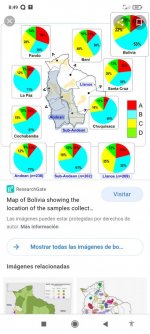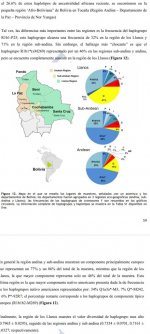I leave this here because we're not talking about only about one set of haplogroups.
https://www.google.com/url?sa=t&sou...EQFnoECAwQAQ&usg=AOvVaw3o-WokX0JwnFi0ffU_TQ7s
It's in Spanish so...


The mtDNA is not from this study and seems to come from indigenous women. But the Y-DNA is the topic of the study and there's a lot more haplogroup R than I expected.
I thought Bolivia was mainly an Amerindian country.
https://www.google.com/url?sa=t&sou...EQFnoECAwQAQ&usg=AOvVaw3o-WokX0JwnFi0ffU_TQ7s
It's in Spanish so...


The mtDNA is not from this study and seems to come from indigenous women. But the Y-DNA is the topic of the study and there's a lot more haplogroup R than I expected.
I thought Bolivia was mainly an Amerindian country.

